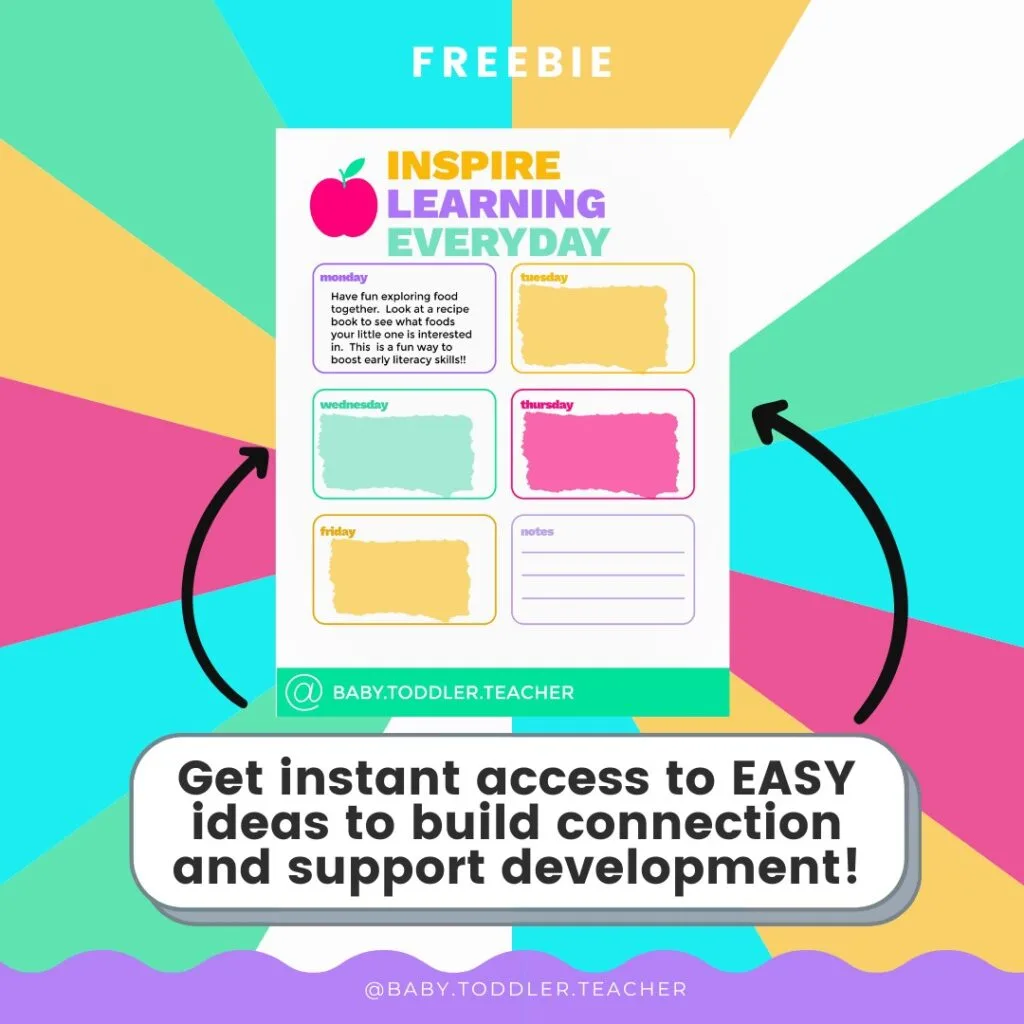There is a magical joy in hearing your baby coo and babble, as these are the building blocks of their language development.
But did you know that you can play a crucial role in fostering your little one’s language skills?
Through simple, enjoyable activities, new parents can create a nurturing environment that promotes language development right from infancy.
In this blog post, we’ll explore fun-filled, language development activities that not only strengthen the bond between you and your baby but also lay the foundation for their communication skills.
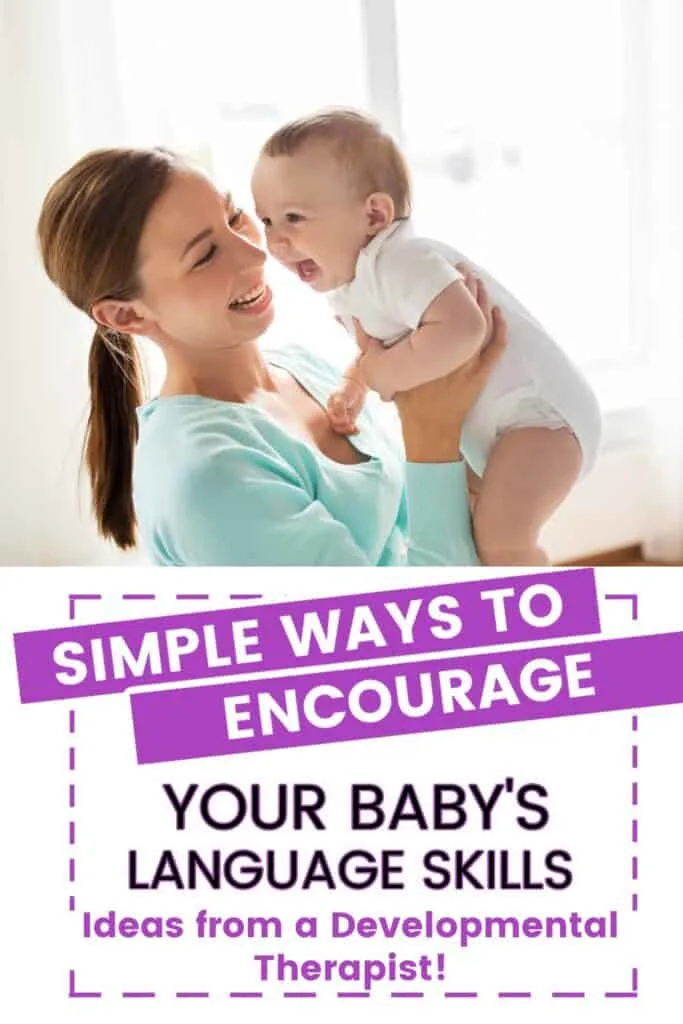
(This post may contain affiliate links. To read our full disclosure policy click here.)
What Language Skills Are Babies Working on in the First Year?
During the first year, babies are like language sponges, keenly absorbing and responding to the sounds and movements in their environment.
One of the first skills they develop is the ability to make new sounds.
From cooing at around 2 months to babbling towards the end of their first year, these sounds are the early stages of speech development.
Imitation plays a critical role during this phase.
Infants observe and start mimicking gestures, sounds, and simple words that they see or hear frequently.
This copying behavior is a fundamental stepping stone in language acquisition.
Another pivotal skill babies work on is listening and reacting to sounds and voices.
Even before they can talk, they begin to understand the nuances of language.
They keenly observe intonation, pitch, and rhythm, which helps them to gradually recognize familiar voices or react to the emotional tone of a conversation.
All these skills work together to pave the way for your baby’s language and communication development.

Make Tummy Time a Positive Experience While Working on Communication Milestones
Believe it or not, tummy time can be a fantastic avenue to encourage language development in your infant.
As your baby spends time on their tummy, they gain a new perspective of the world around them, stimulating their curiosity and interest.
During this time, you can engage your child with different sounds, sing songs, tell nursery rhymes, or talk to them about their surroundings.
This can help stimulate their auditory senses and expose them to varied tones, pitches, and sounds of language.
Furthermore, responding to their coos and babbles not only makes tummy time a positive experience but also supports their communication milestones.
Remember, the more sounds, words, and positive vocal interactions they hear, the better for their language development.
Encouraging Communication Skills Through Daily Routines
Incorporating language learning into daily routines can be one of the best ways to grow your child’s vocabulary.
Everyday activities such as bathing, feeding, or changing diapers provide abundant opportunities for language exposure and reinforcement.
As you engage in these routines, be mindful and intentional in your interactions.
Narrate what you’re doing, describe objects around you, or even sing songs.
This not only introduces new words and sounds but also builds a comforting rhythm of repetitive practice, essential in language acquisition.
Over time, these structured, habitual interactions become a part of your baby’s daily life, seamlessly integrating language learning into their everyday experience.
The key is consistency and repetition, as this helps your baby recognize patterns and predictability in language, laying a strong foundation for their future communication skills.
For more easy ideas and activities on how to support your baby’s development CLICK HERE.

Work on Baby’s language skills during Bath Time
Bathtime offers a fantastic opportunity to work on your baby’s language skills.
The sensory-rich environment of splashing water, floating toys, bubbles, and warm towels can stimulate your baby’s interest and curiosity.
You can use this time to describe the different objects in the bath, introduce words related to temperature like ‘warm’ or ‘cool’, or even narrate a short, fun story about their rubber duck navigating the ‘ocean’ in their tub.
You can name body parts so that these important words become part of their vocabulary.
As they get a bit older you can ask them to point to their body parts which is also great for cognitive development.
The echoey sound that is often found in a bathroom also makes sounds fun to try out.
While you are sitting with your baby try out different animal sounds and how they react!
Singing songs about bathing can also add a musical element to language learning.
Remember to respond to your baby’s coos and babbles during this time, as this interaction is key to their language development.
Bath time, thus, becomes more than just routine hygiene; it is an educational, bonding experience that helps cultivate your baby’s language and communication skills.

Grab your FREE Milestone Guide HERE.
Introduce New Words During Snack Time
Snack time can be an excellent opportunity to introduce new words and concepts to your baby.
Use gestures or baby sign language as a way for your baby to communicate even before those first words come in.
Signs such as “more” or “all done” can be perfect to model and teach during snack time.
During this time, you can talk about the food they’re eating, its color, taste, and texture. For instance, if your baby is eating a banana, you might say, “This is a banana. It’s yellow and soft. Yum, it’s sweet!”
You can also use this time to teach them words like ‘bite,’ ‘chew,’ and ‘swallow.’
Introducing a variety of foods will not only help in developing their palate but also expand their vocabulary.
Remember to make snack time interactive and fun.
Encourage them to touch and feel their food, this can also be a great sensory activity.
Respond to their reactions to different foods and reinforce the words you introduce, setting a foundation for their language comprehension and expression.
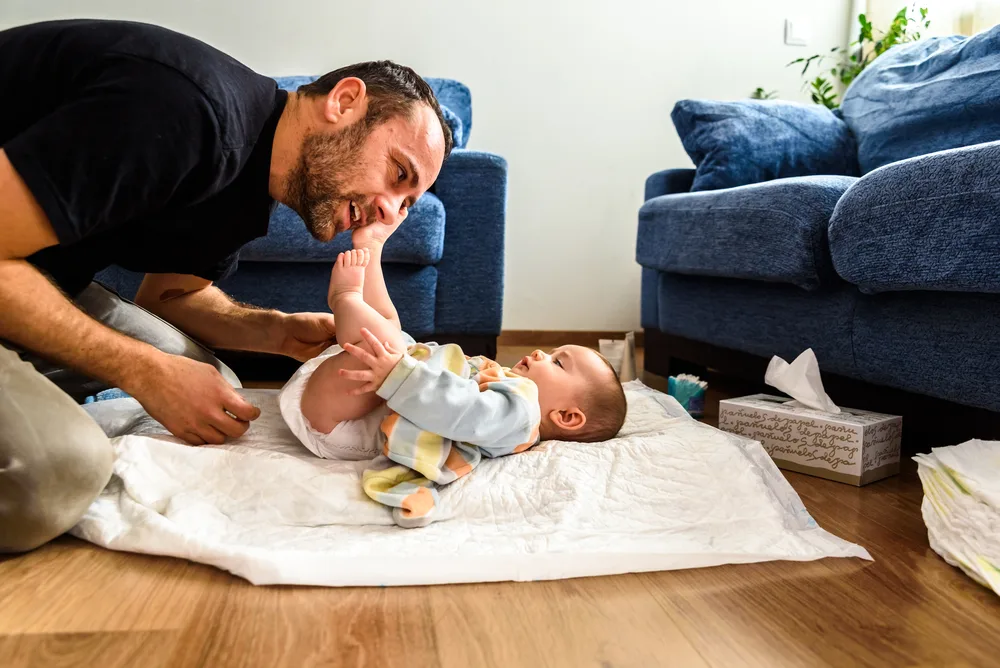
Work on First Words During a Diaper Change
Diaper changes, though seemingly mundane, are actually fantastic opportunities for language learning.
This is because they are routine, repetitive moments that happen numerous times throughout the day, providing ample practice for your baby.
What makes this time even more unique is the face-to-face interaction it allows.
As you change your baby’s diaper, you’re in direct eye contact with them, making it the perfect moment to model new words and sounds.
You can talk about what you’re doing, name the objects you’re using, and even introduce concepts such as ‘wet’ or ‘dry’.
This close interaction is vital for your baby to observe your mouth movement, which aids them in learning to form words.
Additionally, this can be a great time to incorporate a song or a fingerplay.
These rhythmic, musical elements can make language learning stimulating and fun.
Overall, diaper changes offer a unique, intimate setting for language learning right from infancy, turning mundane moments into enriching experiences.
Reading Books Supports Receptive and Expressive Language Development
Reading books to your infant is an incredibly effective method for bolstering early literacy skills and it is a great way to support language development.
It provides a structured setting for introducing new words and concepts, thereby helping to expand your baby’s growing vocabulary.
As you read aloud, your child is exposed to the sounds, rhythms, and patterns of language, which play a pivotal role in their linguistic and cognitive development.
Furthermore, books often include a myriad of topics, characters, and situations, offering a rich source of diverse vocabulary and complex sentences.
This consistent exposure to language aids in the development of both receptive language skills (understanding of words and language) and expressive language skills (ability to express oneself).
Reading is also a wonderful time for interaction.
When your baby responds to the images or the story, ensure to react and engage with them, as this active participation promotes their communication skills.
Therefore, establishing a regular reading routine not only paves the way for early literacy but also significantly contributes to your child’s language and communication proficiency.
So choose one of your favorite board books and take some time to read together!
Check out some of the best books for babies here.
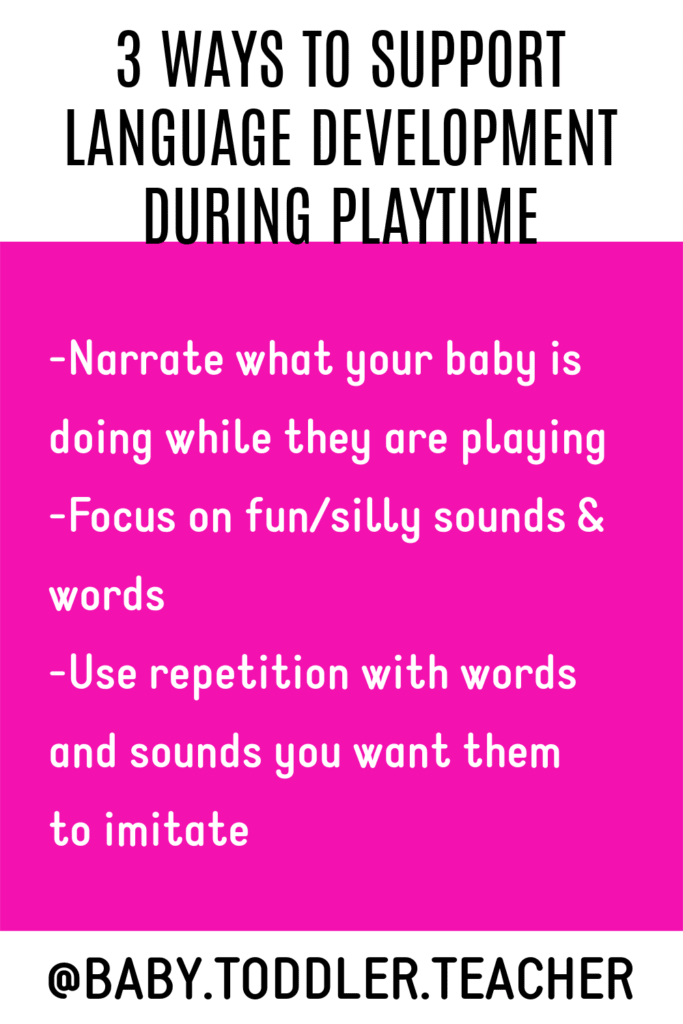
Playtime is Perfect for Early Language Development
Playtime is an ideal moment to stimulate language development in early childhood.
It provides an engaging, interactive environment that naturally encourages communication and linguistic expression.
Children, when at play, are more relaxed and receptive, making learning a joyous experience.
Introducing simple games involving objects around the house can help your child associate words with their corresponding objects, enhancing their vocabulary.
For instance, a simple game of rolling a ball back and forth is the perfect setup for working on the words “ball” and “ready, set, go!”
Finger puppets provide another fun avenue for language acquisition.
It can also be a great way to encourage fine motor skills!
By orchestrating little stories with the puppets, you can introduce new words, expressions, and sentence structures.
This not only encourages language learning but also boosts creativity and imagination.
Moreover, playtime is an excellent opportunity to develop nonverbal communication skills.
From understanding gestures to recognizing facial expressions, this form of communication is a crucial facet of language development.
During play, children also learn to express their emotions, translating them into words, a pivotal step in their emotional development.
Encouraging social play, like playdates or group activities, can also foster social skills and further enhance language proficiency as they learn to communicate with their peers.
Therefore, making language learning a part of playtime can significantly contribute to your child’s linguistic and overall development.
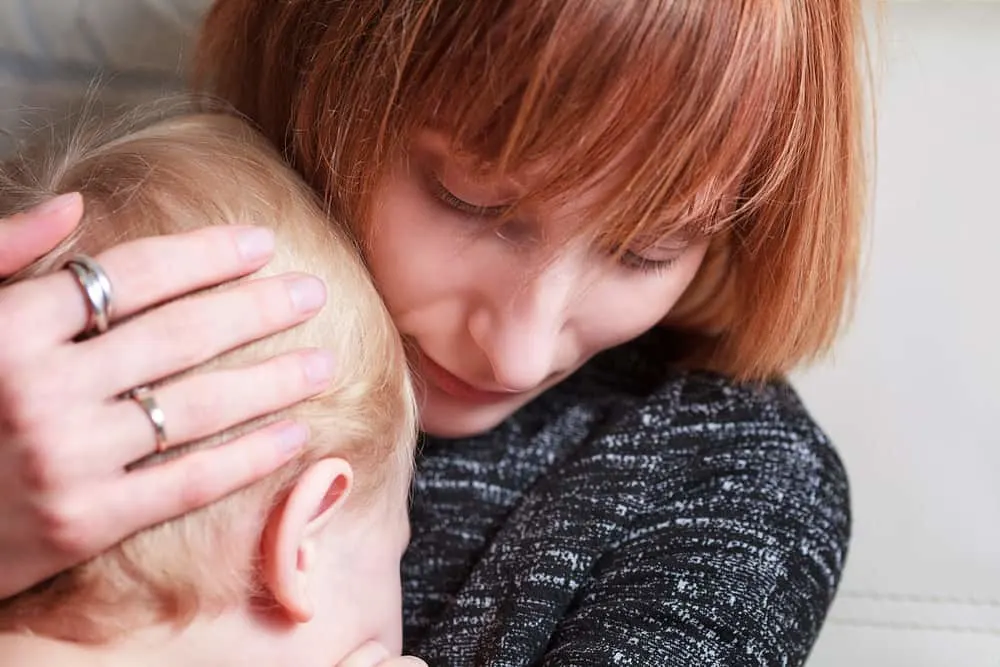
Have concerns about your baby’s language development?
If you harbor concerns about your child’s language development, remember that early intervention is one of the most effective steps you can take.
Early intervention refers to the services and support that can be provided to children who show signs of developmental delay.
These services are designed to address the developmental needs of the child and can encompass speech therapy, physical therapy, occupational therapy, and educational support.
Your child will need to be screened or evaluated to find out if they are eligible for the program by a professional such as a speech-language pathologist, occupational therapist, or developmental therapist.
The earlier these interventions are implemented, the more impact they can have on a child’s development.
It’s crucial to remember that every child develops at their own pace, but if you have concerns, don’t hesitate to seek professional advice, especially in the first year of life.
Early intervention is a proactive, practical approach to supporting your child’s language development and overall growth.
Enjoy These Language Activities with Your Baby
In conclusion, fostering language development in the early years is a beautiful and rewarding journey for both you and your child.
From snack time conversations, and reading books together, to playful learning activities, every moment provides an opportunity to enhance your baby’s linguistic skills.
Remember, it’s not about rushing the process but about creating a nurturing, interactive environment that naturally promotes language acquisition.
So, take delight in each new gesture or word they learn, each sentence they form, and every little story they tell.
And if concerns arise, never hesitate to seek professional advice.
After all, every step you take during this time is a significant stride toward your child’s cognitive, emotional, and social development.
Happy parenting!
Frequently Asked Questions
There are many ways to teach language to infants, but some effective methods include reading books, engaging in playtime activities, and incorporating language into everyday routines and interactions. It’s also important to provide a language-rich environment with plenty of exposure to diverse vocabulary and linguistic structures.
Yes, babies have the ability to learn multiple languages simultaneously. In fact, the earlier they are exposed to different languages, the more quickly they can become proficient in both.
It’s never too early to start teaching your baby language. Even in the womb, babies can hear and recognize voices, and research suggests that they begin to learn language even before birth. However, actively engaging with your baby through talking, reading, and playtime activities can start as soon as they are born. It’s important to follow your child’s lead and not push
Related Posts You Will Enjoy
Simple Learning Activities for Your One-Month-Old Baby
Printable Black and White Pictures for Babies
The Best Baby Floor Mats for Crawling
Easy Math Activities for Infants

Kayla O’Neill has a master’s degree in education as well as a bachelor’s degree in special education with an emphasis in early childhood education. She has been working as a developmental therapist with babies and toddlers in early intervention since 2012. She is also a mom with two young children.
